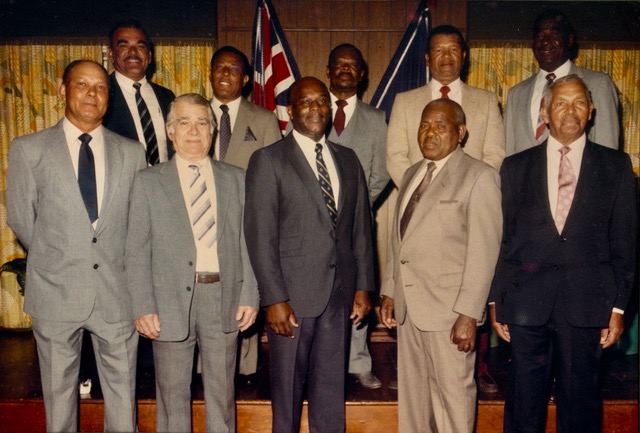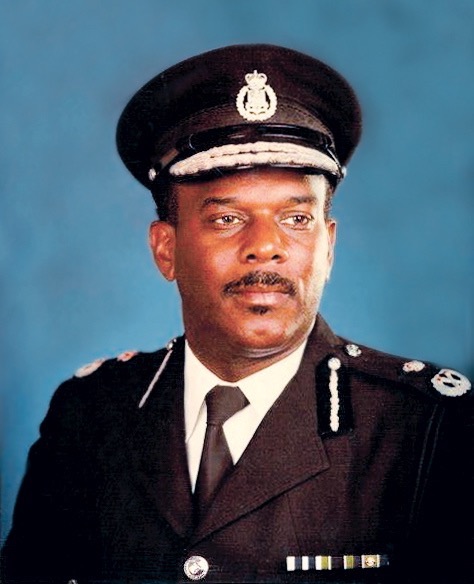
I was born on 30th July 1936 in Sandys Parish and I’ve lived here in Sandys all my life. After leaving school I worked as an apprentice mechanic at Ford Motors (now Bermuda Motors) from 1952-1956.
One of the main reasons for first thinking about a career in the Police Force was my neighbor, P.C. Milton Cholmondley, who had joined the Police Force a few years earlier and he expressed to me the benefits of giving service to the community. I was already thinking about joining a disciplinary organization such as the Regiment.
I was also influenced by a couple of the young men who had travelled to the UK as Dockyard apprentices and after they returned they joined the Police Force. Hilton “Jellybean” Wingood and Alan “Harry” Lister were a little older than me and we played football in the same team, West End Rovers at Somerset Cricket Club. They both told me they were enjoying serving in the Force. They both encouraged me to apply.
Editors note - Both Hilton and Harry made their careers in the Bermuda Police Force, with Hilton rising to the rank of Chief Inspector and Harry to the rank of Inspector.
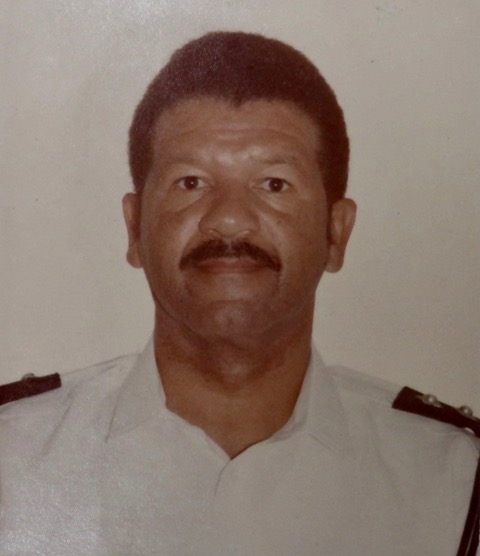
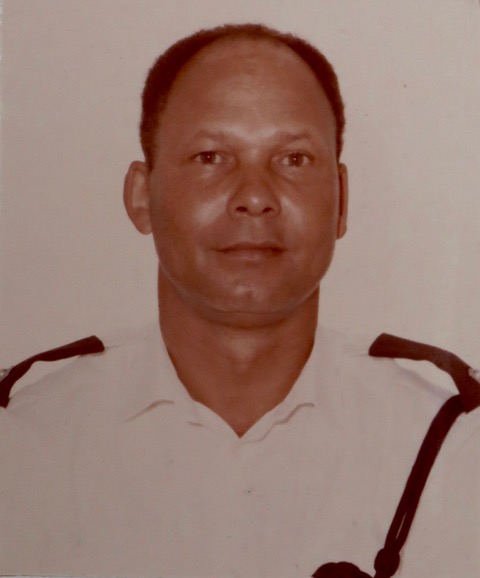
I made an appointment with Inspector “Tug” Wilson who worked out of Hamilton Police Station and he was most helpful. I passed the entrance examination and he gave me some law manuals to read. He took me under his wing and always had time to give me good advice.
At that time there was no special training for local recruits hired in Bermuda, but the recruits hired from the UK would attend a 3 month basic training course at the Police Training School at Mill Meese in Staffordshire.
I joined the Bermuda Police in June 1956. After spending my first week at Hamilton Police Station under the direction of Inspector Wilson, I was posted to a Watch in Central Division. In those days local recruits were assigned to 3,4 and 5 beats which covered Reid Street East, Court Street and the “Back of Town”. The Police Station itself was on Parliament Street where the Government Administration Building is now located, and the adjoining building was Hamilton Prison on the site where the General Post Office now stands. Sometimes on 4pm-12 midnight shift we would even do a security detail for the Prison.
My first Sergeant was Joseph Blackwell, and the Force was led then by Commissioner Henderson and DCOP Max Parker who also worked out of the Police Station. Police Headquarters didn’t move up to Prospect until a few years later when the British Army Garrison was closed.
Our summer uniform then was khaki shorts and shirt, blue socks and caps, while our winter uniform was blue serge. Mid-season uniform was blue serge trousers, white long-sleeved shirts and ties.
Most of the time I was assigned to 3,4 and 5 beats, especially on the Reid Street East area which was the most troublesome part of Hamilton with its bars and street people.
Fortunately for me, I already owned a car so I had a driver’s licence, and after about 9 months on the beat I was made duty driver. I was keen to transfer to Traffic and applied several times but had no luck at that time even though I was an experienced driver.
I spent about 18 months in uniform then 3 months as an aide to CID. When I first started working in CID Colonel Newing was in charge of Special Branch and CID. I worked under Inspector “Bo” Swainson and later under Chief Inspector Oliver Trott.
In March 1957, I was transferred to Traffic as a driver and motor cycle patrol officer. Inspector John Marshall was OIC Traffic, ‘Nobby’ Clark was a Sergeant in Traffic and I worked for a while with P.C. Kenny Roberts. At that time we drove Sunbeam Talbots and we also rode Triumph 500cc motor bikes. We worked in teams of two, with one of us on the bike and one in the car during daytime, and after dark we paired up in the car. We covered three areas then, East, West, and Central.
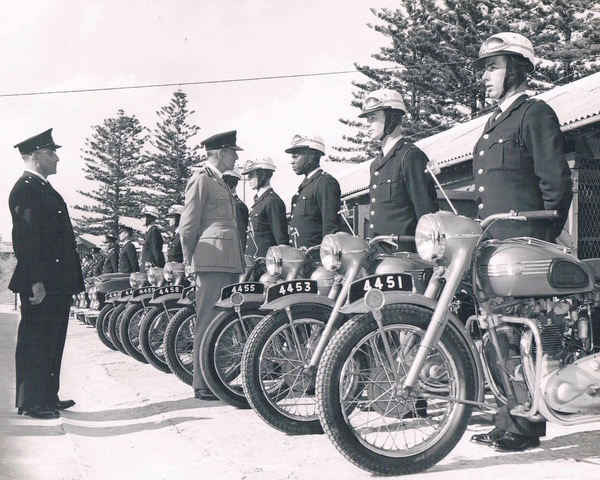
After a spell in Traffic I was posted to Central CID as a detective constable in 1959. I had the distinct pleasure of working on a team under the command of Milton Murray Marsh, along with Sinclair Bean, Leon Bean and John Joe Sheehy
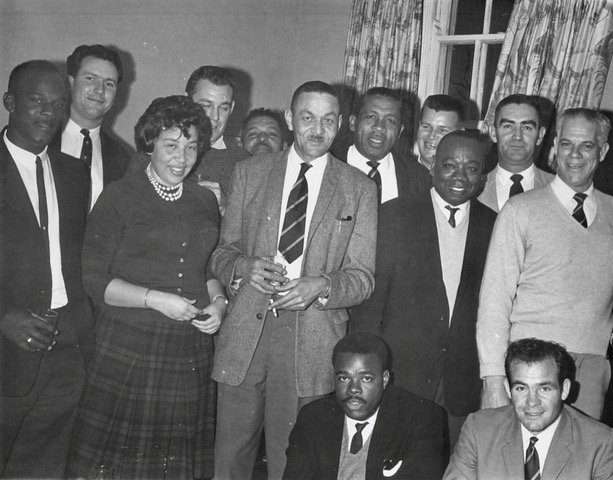
1959 is also the year I married my first wife, Elaine Darrell, from St. George’s, and we had two daughters Rochelle and Gina.
In 1962 I attended a 3 month Detective Training Course at Peel Training College in Chelsea, London. This was a first class course where we received training in many aspects of criminal investigations, including dealing with rape and sexual assaults, violent crime, fingerprinting and identification parades. Immediately after the CID course I spent two weeks training at New Scotland Yard. This provided practical exposure in dealing with investigations and scenes of crime. As a result of these courses I made lasting friendships with fellow UK police officers that lasted for 50 years or more, and I was “adopted” by a family so my time in the UK was a very positive experience.
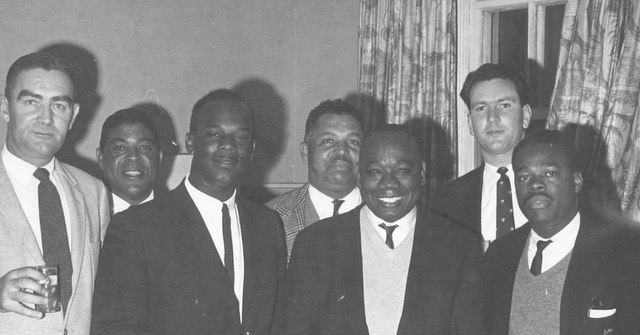
On returning from the UK I was promoted to Detective Sergeant and was transferred to Western Division, my home territory, where Milton Murray Marsh was the D/I. We had a great team there including Inspector Milton Murray Marsh, Earl "Spike" Hazel, Mike Cann, and Dave Lunn. “Nobby” Clark was OIC Western Division. Someone who greatly impressed me during my time in Western CID was D/I Milton Murray Marsh who was excellent to work with. He was a most professional and thorough investigator, and he was a wonderful mentor.
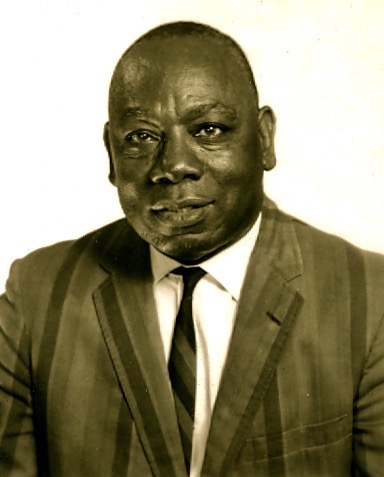
While In Western CID I dealt with numerous narcotics cases making arrests, and while I was working there I recall receiving a phone call from then Commissioner George Robins who commented on the number of drug cases I had handled. He told me he was impressed by my efforts and invited me to visit his office on a Friday morning.
Much to my surprise he not only repeated his comments when I went to see him, he invited me to consider taking on the duties as OIC Narcotics which at that time had just two officers.
I gave it serious thought and on the Saturday I informed the Commissoner that I would like to accept his offer. I took over the next Monday and within a short time he asked me to select my own team to work with. I selected Arthur Bean, Neville Darrell and St. Clair “Brinky” Tucker . This was at a time when marijuana was becoming a major problem in Bermuda.
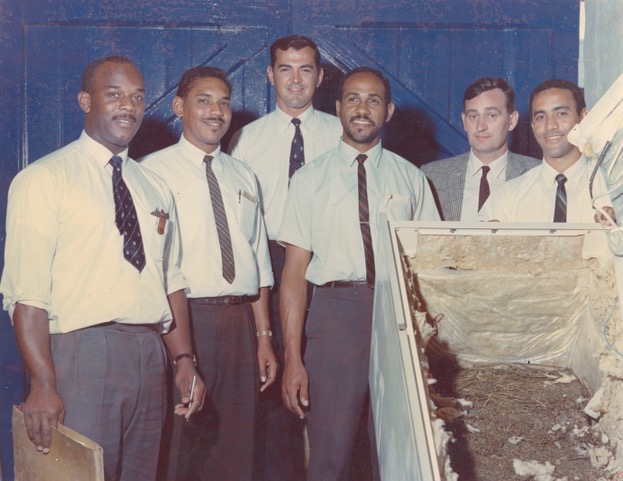
While in charge of Narcotics I attended a couple of Narcotics Courses in the U.S. one of which was at the Federal Bureau of Narcotics in Washington D.C. There were officers from all around the world on this course which was first class. I also attended a Narcotics Officer’s Convention in Louisville where I was asked to speak on a panel and provide input from the perspective of drug problems in a tourist destination, and where illegal drugs were coming from.
During those days Bermuda was having major problems with the importation of illegal drugs, marijuana, and our efforts centred on interdiction and getting to the dealers and the people who were financing drugs deals. A major focus for us were direct flights coming up from Jamaica and stopping in Bermuda prior to heading over to the UK. We had Jamaican nationals and locals concealing drugs on their persons or in their luggage, but it was more complicated than that. They would secrete drugs on the aircraft for removal by ground crew, and their hiding places were very sophisticated.
We had the same sort of problems with cruise ships and freighters arriving at our ports, with both crew and passengers involved in importation. Drug shipments would also be dropped overboard by ships as they travelled through Bermuda waters and these would be picked up by local contacts. Some would be out there pretending they were “fishing”, while others would use speed boats in their efforts to avoid the Police.
We had “mother ships” making deliveries of large quantities of cannabis. We knew many of the dealers, and the loan sharks who could make exhorbitant returns for financing drug importation, and the risk factor for prosecuting the loan sharks was virtually nil.
This was at a time when the drug importers were using every means possible to try to bring in their drugs. Drugs would be smuggled in by parcel post, sometimes oto people who had no idea their names and addresses were being used. The drugs would intercepted before they reached the destination on the parcel.
We also had major problems with drugs being concealed in household furniture or appliances, and in shipments of goods destined for commercial premises which would be opened on the docks.
There was a time when we were monitoring the BA flights from Jamaica and we would ask Customs officers for permission to enter the sterile area to check on suspects, but our requests were denied. Even so, we were having tremendous success in interdicting drugs at the airport because we would stop suspects as soon as they entered the public area.
The Government of the day decided to change the rules so we had the same powers and access as customs officers. We were then able to work more closely with H.M. Customs and we eventually formed the Joint Drug Importation Squad?
I was promoted to Inspector in March 1967, and I was later transferred from Narcotics to Special Branch “E” Department. Again, this was a very challenging job. Much of our work was related to internal security, any potential terrorism threats, subversion and general security of the Island. During the next 4 years I attended two Special Branch Courses in the UK and specialist courses in Canada and the U.S.
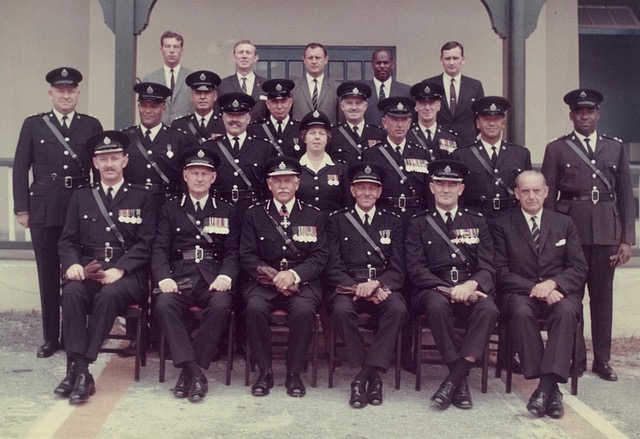
I was promoted to Chief Inspector in 1971 as 2 I/C Special Branch where I remained for the next 3 years and during that time I was promoted to Superintendent in May 1973.
My next move was to uniform as 2nd in command of “D” Department Uniform in May 1974, assisting then Superintendent Jim McMaster. We worked well together as a team. One of our major concerns was in trying to encourage supervisory officers to become more responsible and accountable for their actions and for the welfare of personnel. There were some issues regarding abuse of overtime and poor punctuality in dealing with incidents and submitting reports. There were some personnel whose attitude I could best describe as, “Draw your breath and Draw your pay!”
While working as Superintendent in uniform I realized that although we had a Force Welfare Officer who would be trying to deal with welfare issues along with his regular duties in “A” Department, there were increasing issues with personnel experiencing problems in their social and home environments. These could include all manner of issues which could affect their performance and efficiency. The seriousness of these welfare problems was highlighted when two of our serving officers, Merv Willey and David “Bones” Fraser both took their own lives.
For these reasons I initially sought additional assistance of Reverend George Buchanan of Christchurch in Warwick. I had great admiration for Rev Buchanan who had provided me with excellent advice on several such matters and who offered his assistance going forward. Rev. Buchanan kindly accepted the position of Police Chaplain, our first Police Chaplain, and he made himself available where necessary.
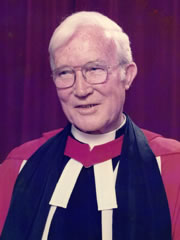
This system worked well for a while but because of increasing demands for his service, which were purely voluntary, we held discussions about how to manage so many welfare issues. Government was advised of our concerns and the extent of our problems. At about that time the Employee Assistance Prgramme, (EAP) headed by Mr. Vaughan Mosher, was set up to deal with the sort of problems we were encountering, and Government made the decision that the services of the EAP should be made available to all Government employees.
The system was such that any of our personnel who needed counselling or assistance could attend the EAP on a strictly confidential basis. If, for example the Police Doctor was dealing with one of our personnel with problems requiring professional counselling, the doctor could refer the patient directly to the EAP. Another example would be if an officer or the spouse of an officer came to me, or if I heard of someone with a concern, then I could refer the matter to the EAP. This was all done in the strictest confidence.
One of the most unusual assignments I ever had was being seconded to the Turks and Caicos Islands on a short term basis in March 1975 as the Acting Commissioner of Police after their English Commissioner of Police resigned suddenly.
Turks and Caicos had been under the administration of the Governor of Jamaica until Jamaican independence in 1962. Turks and Caicos then became a Crown colony and by 1965 the Governor of the Bahamas was also governor of Turks and Caicos until 1973 when the Bahamas gained independence, after which they had their own Governor.
A problem arose when the Turks and Caicos Commissioner of Police suddenly resigned. The UK was in a quandary because they couldn’t find a replacement Commissioner at very short notice, so the Bermuda Government was asked to find a temporary replacement until a permanent Commissioner could be hired.
Myself and Chief Inspector Peter Stubbs were asked to take over the running of the Turks and Caicos Police Force, and we arrived on Island to be met at the airport by the COP. We agreed to meet with him the following morning at Police Headquarters for a briefing and handing over. However, when we arrived at Police Headquarters the next morning at the appointed time we discovered that he was not there, and we never saw him again. He had left the Islands without a word to anyone.
We were duly sworn in at Government House by the Governor.
I think it would be fair to say that the Islands and the Police Force were in a state of turmoil. We were not warmly welcomed by some of their senior officers so we soldiered on, never losing sight of the objective of having them work with us in a caretaking capacity until a suitable replacement could be found. I should add that while in Turks and Caicos I was not only tasked with being Acting Commissioner of Police, but I was also Acting Commissioner of the Prison Service, the Fire Service and Customs and Immigration.
There were major challenges for us and we had to discipline some of their personnel who were suspected of corruption;
We had received reliable information from the DEA in the U.S. that small planes carrying contraband drugs were stopping off to refuel at the only airport in Turks and Caicos under cover of darkness when it was supposed to be closed. We posted a constable at the airport for the sole purpose of obtaining identification numbers of all planes touching down after dark.
On checking his books we saw that the constable had made no entries of any activity even though the owner/operator of the airport fuel supply complained that the fuel hoses were being cut, and thousands of gallons of aviation fuel was missing.
While there we had reason to arrest a prominent Innkeeper on suspicion of being involved in drug smuggling . When we arrived to search his premises it was obvious he had been tipped off about our impending arrival because he was waiting to greet us and he openly told us we would not find any drugs on his premises. Following his arrest I received all sorts of threats from him and his associates (henchmen?) when he was brought to the police station. Although we did not find any drugs we did find some very useful information about criminal activity during the search of his premises but I would prefer not to go into any further explanation in that regard.
Fortunately, a replacement Commissioner was recruited quite quickly and Peter and I returned to Bermuda about 6 weeks later.
In 1976, I attended the Oversea Command Course at Bramshill which was designed for senior officers who were being groomed for the role of Commissioner. We had officers from around the World, mostly from Commonwealth countries such as Australia, New Zealand, Hong Kong, and countries in Africa, the Caribbean, and the Middle East, along with regional forces in the UK.
Members of my group were mainly from the Caribbean, Africa, and the Middle East including Kuwait, Saudi Arabla and Iran. We studied all aspect of leadership in modern police forces. This was a 3 month course, and it provided us with excellent leadership training which I found to be invaluable throughout the rest of my career.
In addition to studies we also enjoyed social activities and I was chosen to be captain of our indoor soccer team and cricket team.
Immediately following the course I served an attachment to the Sussex Police in Southend-on-Sea to provide exposure to current police methods being used in the UK such as community policing.
Police training in general was changing around the world as it needed to adapt to modern problems. There were growing concerns about kidnapping for political and financial gain by rebel groups and the taking of hostages. One in particular was the kidnapping of Patty Hearst by the Symbionese Liberation Army in the U.S.
In 1978 I attended an IACP Hostage Taking Course Conference in Ottowa, Canada, run by the RCMP and designed to train police officers in negotiating techniques. There were police personnel there from across Canada and we took part in a series of mock exercises where we played the parts of hostages and as negotiators on how to respond to the demands of kidnappers. I recall that one of the subjects we studied was the Stockholm syndrome where hostages sometimes identified with and sympathized with their captors.
Although I never found myself in a situation where I had to negotiate in a hostage situation we have had incidents here in Bermuda where individuals have been held hostage, usually in domestic cases, which have to be handled with great care.
In 1979 I was appointed ACOP Crime. In 1980 I was promoted to DCOP, and in 1981 I was appointed Commissioner of Police – taking over command from COP L.M. “Nobby” Clark. I held the post of Commissioner for 9 years until my retirement after a total of 35 years in the Bermuda Police.
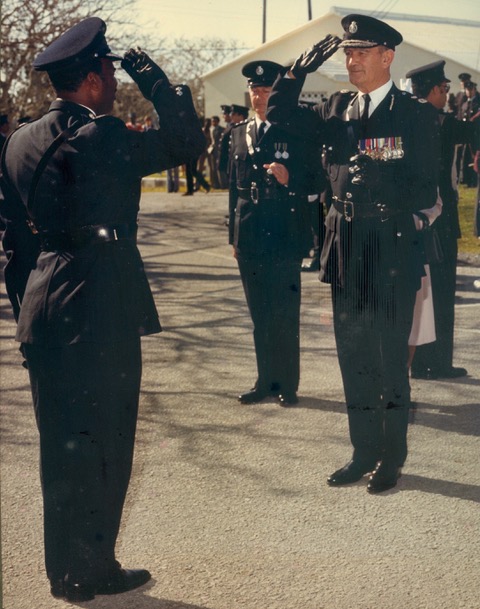
Just a few weeks after I was appointed Commissioner in 1981, Bermuda went through major industrial disputes. I believe it started with the BIU withdrawing labour from the hospital and it escalated to include the hotels causing the departure of many visitors to the Island. Tragically, this occurred at what was probably the high point of tourism in Bermuda and we have never really recovered from that time. It was a tough introduction to life as the Commissioner of Police.
One of my greatest concerns while serving as Commissioner was Health and Welfare. There were concerns about the possibility of cancer-causing agents at the single men’s quarters, possibly due to asbestos in the roofing. Similarly, we also had health related problems at Hamilton Police Station. The Station was then located near the bottom of Parliament Street in an old building vacated by HM Customs and we were advised that it would be on a very temporary basis. Despite some renovations the building was never suitable as a Police Station.
I can recall promises of a new police station dating back for something like 50 years so the new Hamilton Police Station was a long time coming, but I must say it is most impressive. I thoroughly enjoyed my visit there at the invitation of Commissioner Michael DeSilva who invited myself and three other retired Commissioners, Clive Donald, Jonathan Smith and George Jackson.
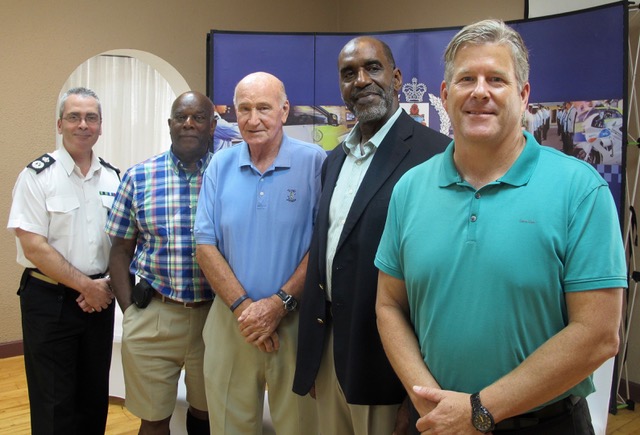
During my younger days I played cricket in the Police Cricket Team, and I also enjoyed playing tennis and squash as recreational sports.
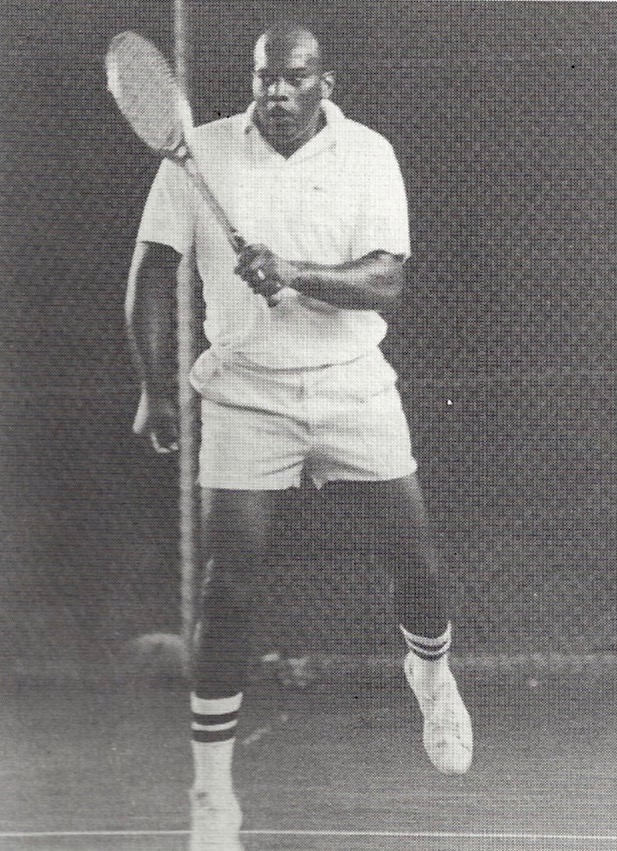
I think one of my greatest pleasures was to be a founding member of the Bermuda Police Choir. The choir was formed by chance, in Somerset in 1963. The officer in charge of Western Division at that time was L.M. “Nobby” Clark who invited a group of us to his house to celebrate Christmas. We certainly got into the “spirit” of Christmas and sang carols and anything else we knew. I have to say we sounded pretty good right from the start. We then decided to meet on Boxing Day at Westmore Bean’s house and we moved on from there, making merry, and singing our hearts out. The choir went from strength to strength and we stayed together for the next 30 years until 1993.
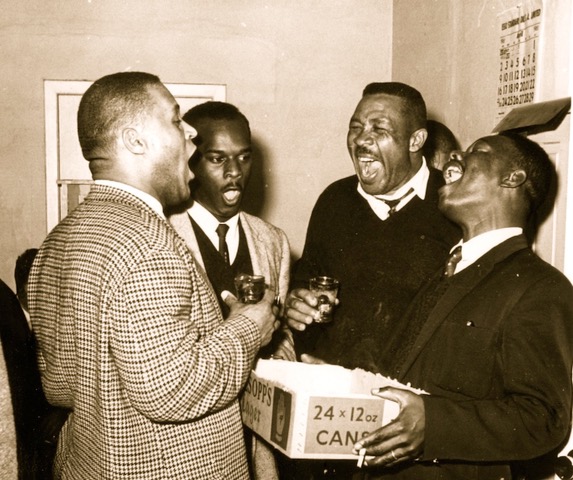
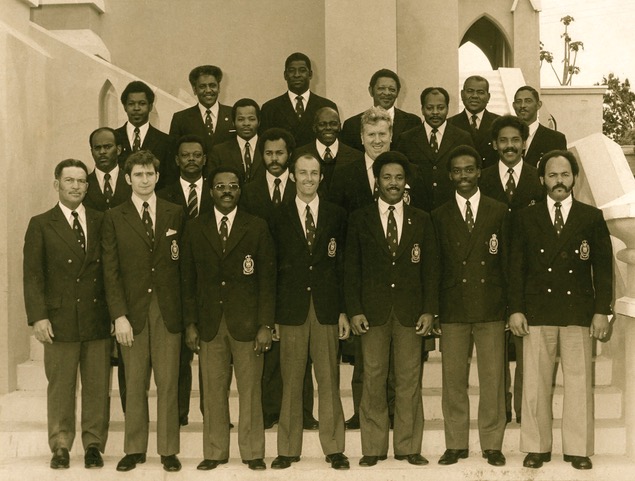
Following the 1968 riots there weren’t many tourists coming to Bermuda. By that time our Police Choir had performed throughout the Island and we had established an excellent reputation. We were approached by Government and they agreed to have the Department of Tourism arrange a series of concerts for us to perform along the Eastern seaboard as a way to promote more visitors. We even appeared on live TV and our tour was very successful.
We also participated in command performances at the Rosebank Theatre, and performed at such prestigious events as the Speaker’s Dinner, at Government House including official visits by HRH Prince Phillip, the Duke of Edinburgh, President Jomo Kenyatta of Kenya, and the Governor General of Ontario. We also visited Ottowa and Toronto on choir tours and we hosted the Ottowa Police Male Choir and the Toronto Police Choral Group.
As a police officer one certainly has to deal with some strange and unusual incidents. As a young detective I can recall investigating a series of prowling incidents on White Sandys Road in Paget. One night I was on 10pm – 6am shift when we were called to a prowling and started interviewing a female complainant who described how she had seen a man outside her window who appeared to have on only a white headdress of some kind – maybe a towel.
We were inside her house conducting the interview when she looked across the room and said, “there he is again, outside the window”. He couldn’t see us so we asked the lady to keep on talking while we asked her to tell us which was the quickest exit point. We quickly opened the door and ran outside. The prowler turned and ran as fast as he could, and I think one of us shouted, “Halt or I shoot”! It must have confused him because he turned round to see what we were doing and ran straight into the bow of a tree which caused him to bounce off it straight into my arms. Believe it or not he was completely naked apart from the white towel around his head. I still remember who he was and his punishment. He received 6 months imprisonment.
While I was I/C Narcotics I can recall a couple of incidents at the airport when we searching suspected drug importers. We’d seen one particular guy departing on a trip and when he left he was short and skinny – about 120 lbs. When he returned 2 weeks later he’d put on a huge amount of weight – all below the waist! So, we decided to search him. We discovered he was wearing a ladies girdle along with a pair of men’s briefs, and in between the two he had packed cannabis. It was fortunate that we’d seen him leaving and knew he was skinny, and when we searched him the cannabis was loose and was oozing out of his underwear. Once we arrested him he begged us not to let out the fact that he was caught wearing ladies underwear. He pleaded guilty to importing the cannabis!
I also recall a women arriving at the airport from Jamaica with a large hairpiece in a cardboard box and attached to a styro-foam mannequin. It was literally bursting with cannabis that was falling out of the stitching. When we confronted her about the cannabis she expressed her innocence and said, “Lawd man, who could do a thing like this to me!”
While serving as Commissioner I was honoured to be directly involved in organising Royal Visits by Her Majesty Queen Elizabeth II in 1983, and Her Royal Highness Princess Margaret. These visits had to be carefully planned and both went off very smoothly.
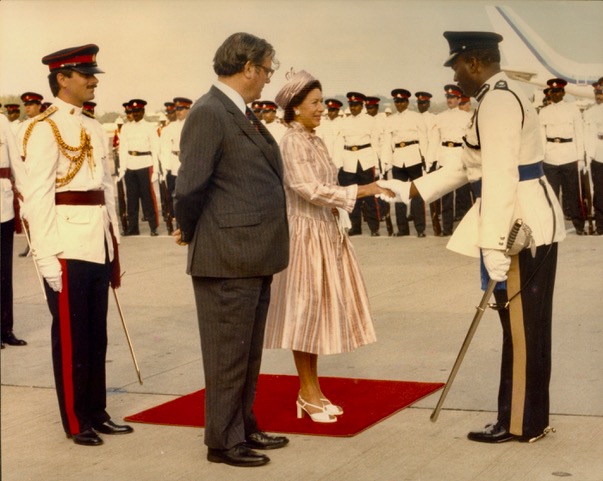
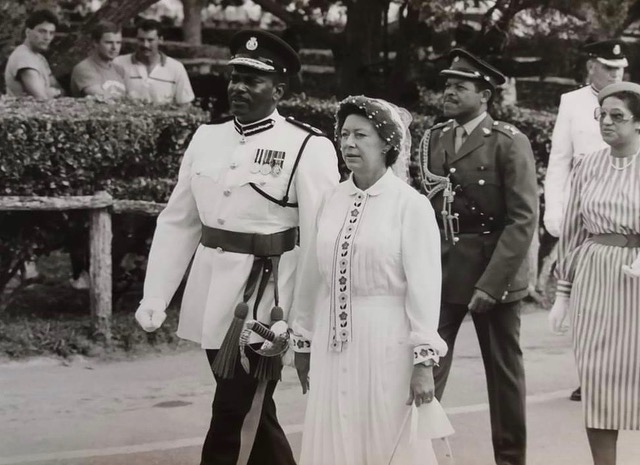 Commissioner Fred Bean escorts HRH Princess Margaret
Commissioner Fred Bean escorts HRH Princess Margaret 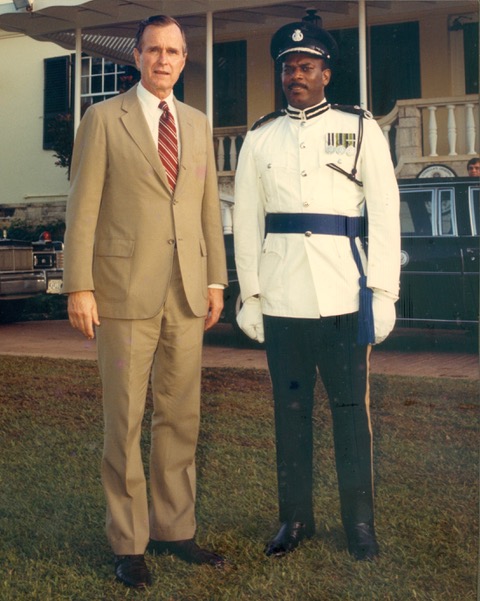 COP Fred "Penny" Bean with President George Bush
COP Fred "Penny" Bean with President George Bush
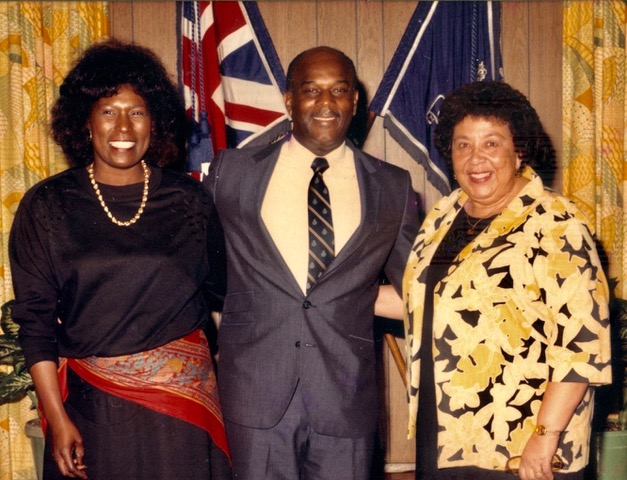
Being a police officer for 35 years certainly had its moments, some very serious and difficult to deal with, and some most amusing. I met people from all walks of life from Presidents and Princesses, politicians who were supportive and some who were not, police officers who were totally dedicated to their job, and some who were not, members of the public who it was a privilege to assist, and common criminals who it was my duty to bring to justice.
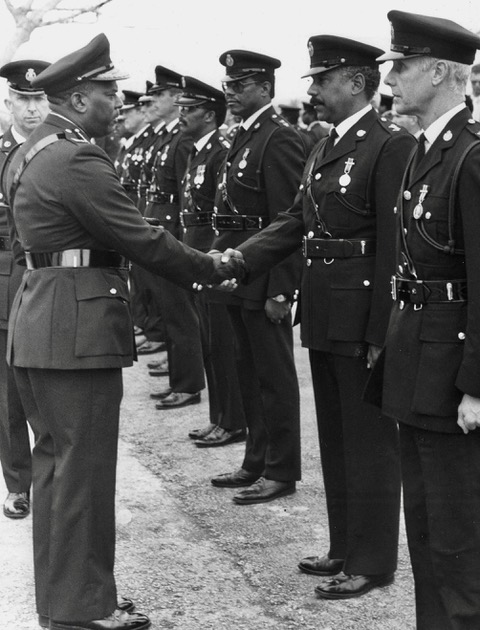
Although I’m now retired I still stay active doing community service, working with senior citizens and with the sick and shut in.
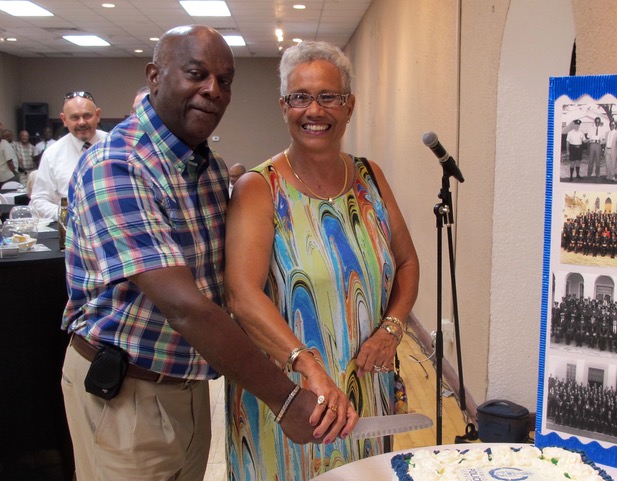
I am also very lucky to have two lovely daughters who are both happily married. Rochelle is married to Cole Simons and they have two daughters, Morgan Simons (aged 28) and Erin Stovell, who is married to Josh Stovell.
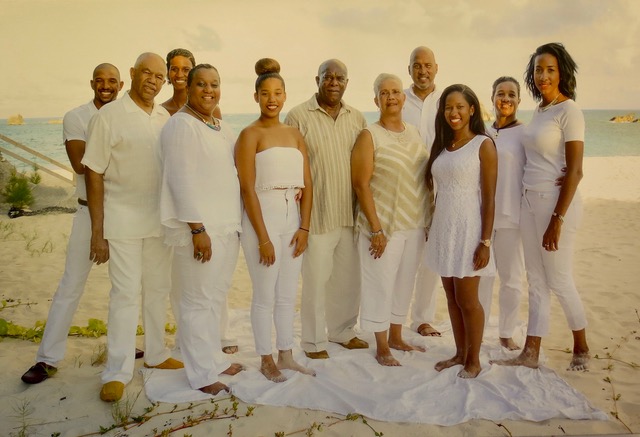
My other daughter, Gina, is married to Dr. Burton Butterfield and they have two daughters, Kayleb and Carmel (aged 18).
Having had two daughters, and four granddaughters it appeared that our my family would only produce girls, but 4 months ago we were blessed with our first great-grandson, Eli Stovell.
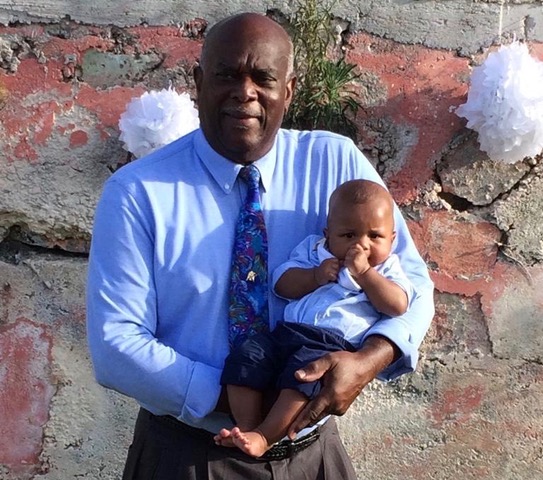
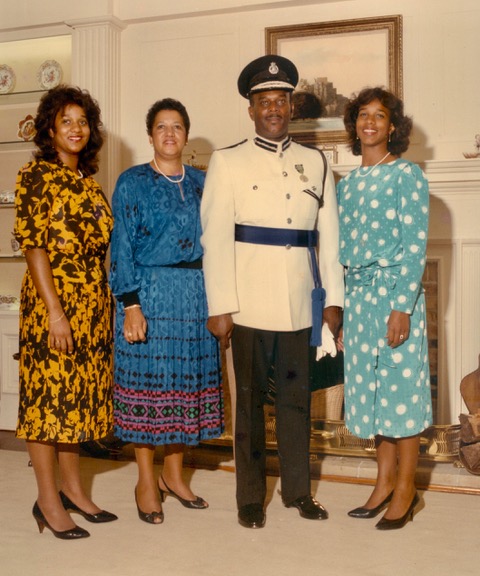
During his police career Mr. Bean was awarded 6 Commissioner’s commendations; one from the Supreme Court; the Long Service and Good Conduct medal, the Colonial Police Medal for Meritorious Service, the Queen’s Police Medal, and in 1991 he was awarded the OBE.
Commendations awarded
11th May 1959
Commended and awarded £3 for zeal and devotion to duty in apprehending a person for dangerous driving
2nd November 1959
Commended and awarded £5 for zeal and arresting a person convicted for larceny from a vehicle.
30th May 1960
Commended and awarded £5 in affecting the arrest of a man who was convicted of burglary
29th January 1965
For persistent and thorough investigation resulting in a person being convicted of rape on his own plea and sentenced to 20 years imprisonment
29th January 1965
Congratulated by the Chief Justice and commended for disarming a robber, with disregard for his own safety
16th July 1965
Commended for persistent and excellent investigation in cases of 5 major shop break-ins
25th March 1966
Commended for excellent investigation resulting in conviction for importation of Indian Hemp. One person sentenced to 5 years and the other person to a fine of £500 or 9 months imprisonment.
